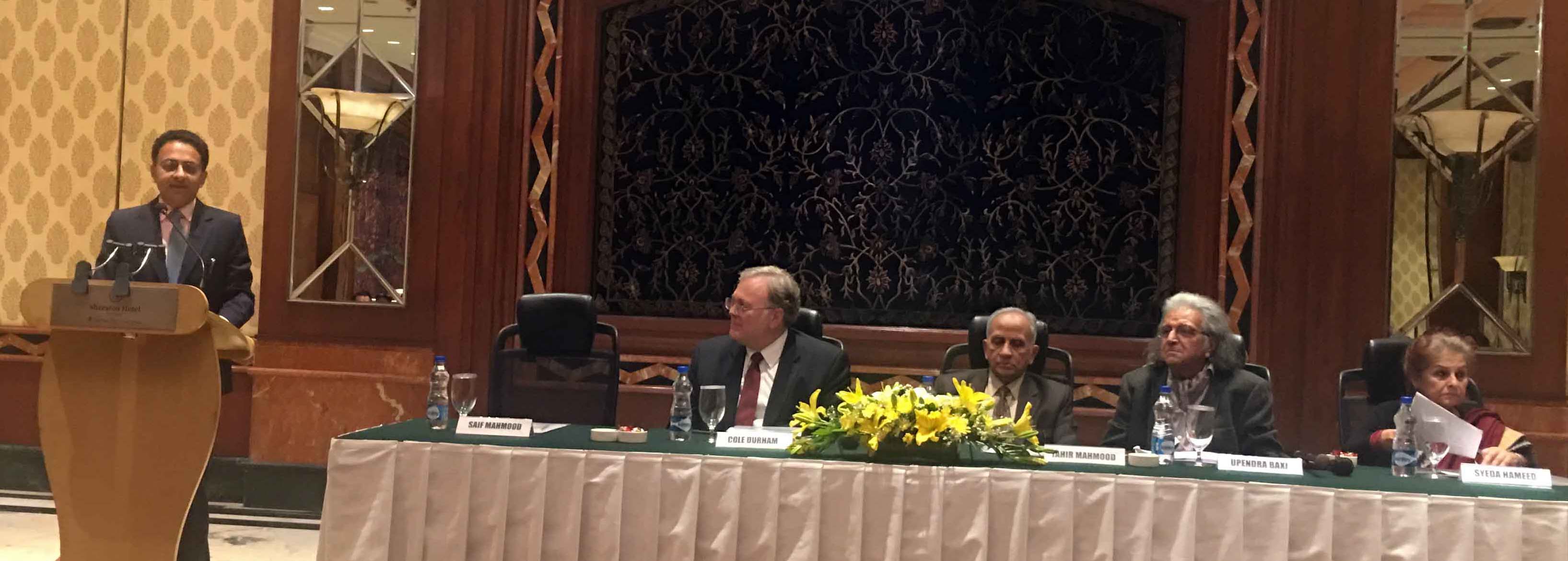SACRALS Conference February 2018: Religio-Legal Parameters for Social Harmony

During the first three days of February 2018, the South Asia Consortium for Religion and Law Studies (SACRALS) convened the event “Religio-Legal Parameters for Social Harmony” at Hotel Sheraton New Delhi, India. Participants in the Meet included eminent scholars, jurists, and legal and interfaith leaders from the South Asia Area, with visitors from Australia and the United States. Under the direction of SACRALS Founding President Professor Dr Tahir Mahmood, meetings were held both at Hotel Sheraton and at Amity University in nearby Noida, Uttar Pradesh.
The Inaugural Session of the Meet on the evening of 1 February was chaired by Professor Tahir Mahmood. Participants were welcomed by SACRALS Board of Trustees Chair Dr Saif Mahmood and heard an inaugural address by Professor Upendra Baxi, Former Vice-Chancellor, Delhi University & Visiting Professor, Warrick University, UK, and stirring words from Guest Speaker, Dr. Syeda Saiyidain Hameed, Former Member, National Commission for Women & Planning Commission of India.
Other esteemed participants and their presentations over the next two days included the following:
Dr Kamal Hossain – “Consensus on Fundamentals for Social Harmony in South Asia”
Justice Peter Mohan Peiris – “Post-Conflict Reconciliation Processes in Sri Lanka”
Dr S. Sivakumar – “Legal Norms for Ensuring Religious Harmony in India”
Dr Kiran Gupta – “Scriptural and Legal Precepts for Social Harmony in India”
Dr S. Sivakumar – “Legal Norms for Ensuring Religious Harmony in India”
Ms Farzana Mahmood – “Religious Minorities and the Law in Bangladesh”
Dr Manoj K. Sinha – “International Human Rights and Religious Freedom”
Dr Ramesh Parajuli – “Religion and the Constitution in Modern Nepal”
Professor Neville Rochow SC – “Nature Abhors a Vacuum: Article 18 of ICCPR and the Effects of Action and Inaction”
Professor Abdillah Masykuri – “Social Harmony through Religious and Legal Precepts in Indonesia”
Professor Jaclyn L. Neo – “Religious Harmony as a Constitutional Norm in Singapore”
Professsor Apoorvanand – “Challenges of Living Humanity”
In addition to the remarks of Professor Mahmood, opening and closing addresses were given by Professor W. Cole Durham, Jr., Founding Director of the International Center for Law and Religion Studies and Patron d’Honneur of SACRALS. Professor Faizan Mustafa, Vice-Chancellor, NALSAR Law University, Hyderabad, gave the Valedictory Address, and Dr Moinudding Ahmad, News Editor, Indiatimes.com and SACRALS Honorary Secretary, delivered the Vote of Thanks to participants.
In addition to Professor Mahmood, Session Chairs were Justice Jaspal Singh, Former Judge, High Court of Delhi; Dr Madan Verma, President, InterFaith Foundation of India; Adv. Irfan Engineer, Director, Centre for Study of Society and Secularism, Mumbai; Mr Firoz King Husein, member of the International Advisory Council of the International Center for Law and Religion Studies (ICLRS, Brigham Young University Law School); and Ms Donlu Thayer, JD, ICLRS Senior Editor.
SACRALS was established at a meeting of international religious scholars in New Delhi in January 2017. Under the direction of Professor Tahir Mahmood, the organization receives institutional support from Amity University and Brigham Young Young University (United States) and partners with the InterFaith Foundation, India, and the International Center for Law and Religion Studies (USA). SACRALS aspires to conduct academic programs in all the eight South Asian nations — Afghanistan, Bangladesh, Bhutan, India, Nepal, Sri Lanka, Maldives, and Pakistan — besides collaborating and interacting with similar institutions and organizations operating at national, regional, and international levels in other parts of the world.
At the conclusion of formal proceedings, Professor Durham held an informal additional session, attended by most of the delegates, in which he outlined the concept of the G20 Interfaith Summit, the next of which is to be held later in 2018 in Buenos Aires, Argentina. He explained how international faith groups have an important role to play as participants and policy framers to ensure that economic goals are set while recognising the important role that freedom of religion or belief plays in positive outcomes. A number of those present expressed interest in participating in the Summit in some way.